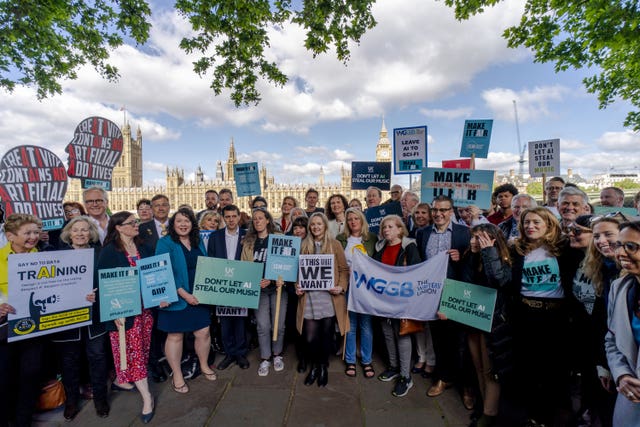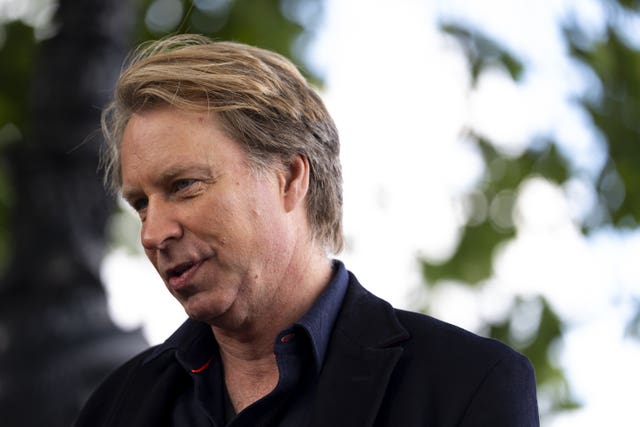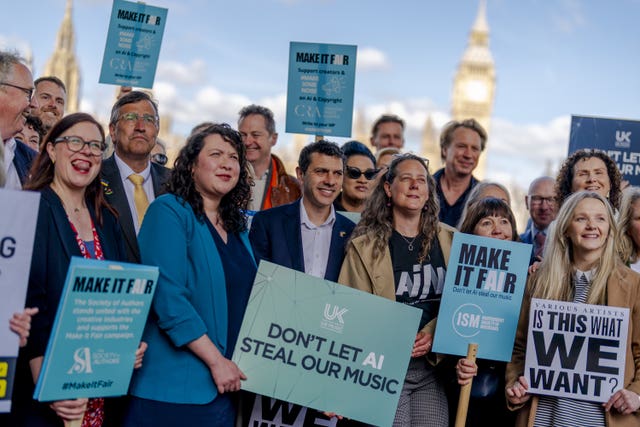Producer Giles Martin says Government must do more to ‘protect artists’ from AI
Industry leaders gathered in London to call on the Government to scrap plans that would allow AI firms to use creative content without permission.

The Government must do more to “protect artists” from AI developers as a data Bill moves through parliament, award-winning producer Giles Martin has said.
Creatives, industry leaders and politicians gathered in central London to call on the Government to scrap plans that would allow AI developers to use creative content without permission or payment.
It comes ahead of a parliamentary debate where MPs are due to discuss the Data (Use and Access) Bill which primarily covers data-sharing agreements, but has received a backlash from the likes of UK Music after transparency safeguards were removed at committee stage.
Martin, a Grammy-winning English record producer and son of Beatles producer George Martin, attended the event claiming that the Government is not doing enough “to protect artists”.

He said: “The Government seem to be more and more influenced by large technology companies, seem more impressed by them.
“(If) Paul McCartney today writes Yesterday, that should belong to him, or he should just say what happens to that, or his voice. He should say what happens to his voice and right now, with the Government, they’re not doing enough to protect artists.
“If you make something, if something is yours, it shouldn’t be taken by a company and used without your permission. It’s as simple as that.”
UK Music claims the Bill would put creatives at risk after amendments put forward by Baroness Kidron to ensure transparency and international compliance safeguards were removed.
The protest saw industry leaders and creatives call on the Government to make changes to the Bill to ensure that companies training generative AI models, such as ChatGPT, disclose whether work by a human creator has been used and protect creatives under existing copyright rules.
Martin added: “I think we should be worried about protecting artists, and actually not just artists. I think people’s own personalities, their own voices, their own creations. I think that’s what needs to grow. I think we need to look after the individual. I think tech companies will look after themselves.”

Currently, British songs, films, paintings and news articles are protected under UK copyright law but a recent Government consultation proposed that it could offer tech companies free access to British music, films, books and more in order to train generative AI models without permission or payment, with creators required to “opt-out” if they do not want their work to be used.
Alex Sobel, MP for Leeds and Central and Headingley, who also attended the event, tabled an amendment to the Bill, requiring greater transparency from tech companies, ensuring that creatives know when their work is being used and how.
Mr Sobel said: “I’m very concerned about creator content being ingested by AI without any traceability.
“It’s really important for creators, creative industries, that we have traceability, that we know what’s going in, so artists and creative companies are not completely deluded of income in the future.
“It could absolutely ruin the creative industries in the UK.”
The consequences of the Bill, if the amendments do not go through, could point to a future with “no income in music” according to Mr Sobel.

Describing how this would impact new artists if protections are not added to the Bill, Mr Sobel said: (AI models would) ingest a few different catalogues of similar artists, Dua Lipa, Calvin Harris, etc. You create a song, the song sounds just like them. The streamers just put those AI-generated songs.
“Artists don’t get anything. Record companies don’t get anything because nobody knows what was ingested in so people are listening to content but nobody’s earning any income. And what happens in future? No new artists come through because there’s no income in music. So then we just have legacy industry, and nothing new.
“What we don’t want to do is stop progress. All we do is ensure that those creators and creative industries who generate the content are being recognised and enumerated.
“I think there’s a lack of understanding about the real significant dangers, because it’s a new area, because it’s complicated, because it’s confusing.
“There isn’t just one form of AI. There’s generative AI, which is this one we’re worried about. But there’s also assistive AI, where artists might use AI to create songs, that’s completely different, and people can easily get confused between different types of AI and what they do and how they operate.”
Lord Watson of Wyre Forest, chairman of UK Music, said: “The UK music industry has always embraced tech. We’ve been at the forefront of using tech to create new sounds to give new energy to different generations of music. That’s not going away. But what we’re saying is there is a danger with this particular technology.
“We’re at a critical point in the future of British music. Give our creators and music and businesses protections they need and deserve, and we can carry on going forward with the British music industry in good condition.”
A Government spokesperson said: “As it stands, the UK’s current regime for copyright and AI is holding back the creative industries and AI sector from realising their full potential — and that cannot continue.
“Currently, creatives are not being fairly compensated for their content and only the largest rights holders have the power to effectively assert their rights.
“We want to enhance their ability to be paid for the use of their material. UK AI developers also face greater innovation barriers than their international competitors, pushing AI innovation overseas.
“The Government’s objectives are to deliver a solution which will ensure increased control and transparency for rights holders and access to high-quality material to train leading AI models in the UK.”





